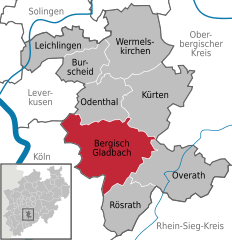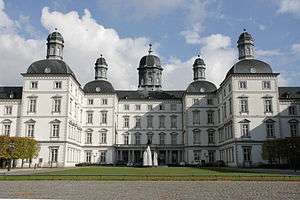Bergisch Gladbach
| Bergisch Gladbach | |||
|---|---|---|---|
|
Forecourt of Schloss Bensberg | |||
| |||
 Bergisch Gladbach | |||
Location of Bergisch Gladbach within Rheinisch-Bergischer Kreis district 
 | |||
| Coordinates: 51°06′N 07°07′E / 51.100°N 7.117°ECoordinates: 51°06′N 07°07′E / 51.100°N 7.117°E | |||
| Country | Germany | ||
| State | North Rhine-Westphalia | ||
| Admin. region | Köln | ||
| District | Rheinisch-Bergischer Kreis | ||
| Government | |||
| • Mayor | Lutz Urbach (CDU) | ||
| Area | |||
| • Total | 83.12 km2 (32.09 sq mi) | ||
| Population (2015-12-31)[1] | |||
| • Total | 111,366 | ||
| • Density | 1,300/km2 (3,500/sq mi) | ||
| Time zone | CET/CEST (UTC+1/+2) | ||
| Postal codes | 51401-51469 | ||
| Dialling codes | 02202, 02204, 02207 | ||
| Vehicle registration | GL | ||
| Website | www.bergischgladbach.de | ||
Bergisch Gladbach (German pronunciation: [ˌbɛɐ̯gɪʃ ˈglatbax]), is a city in the Cologne/Bonn Region of North Rhine-Westphalia, Germany, and capital of the Rheinisch-Bergischer Kreis (district).
Geography
Bergisch Gladbach is located east of the river Rhine, approx. 10 kilometers east of Cologne.
Neighbouring municipalities
Beginning in the north clockwise the neighbouring municipalities and neighbouring towns are: Odenthal, Kürten, Overath, Rösrath, Cologne and Leverkusen.
History
Early settlements existed in the 13th century, but the town was officially founded in 1856.

The word Bergisch in the name does not originate from its location in the county of Berg and was not added to distinguish it from Mönchengladbach as believed by many people, but from the counts who gave their name to the region. At the start of the 12th century the counts of Berg settled in the area and it later became the duchy (under Napoleon, the grand duchy) of Berg. This is where the first part of the name (Bergisch) comes from, the town being located in the former county of Berg. It is the administrative headquarters ('Kreisstadt') of the Rheinish-Bergisch district (or 'Kreis').
The second part of the name, Gladbach (cognate with English Ladbrooke) originates from Low German (Bergisches Platt) and means canalised stream, referring to the small river (the Strunde) that was artificially canalised (laid) in early medieval times. In Bergisch Platt, the regional dialect, laid is said gelaat, a word which eventually evolved to glad (in this case the 'd' is pronounced as a 't'). The second part of the word, bach is the standard German word for a small stream, referring in this case to the Strunde.
In 1975 the town incorporated neighbouring Bensberg and when it reached a population of 100,000 in 1977 it was given city status.
| Largest groups of foreign residents[2] | |
| Nationality | Population (2014) |
|---|---|
| 2,123 | |
| 882 | |
| 878 | |
| 679 | |
| 300 | |
| 288 | |
| 260 | |
| 257 | |
| 241 | |
| 208 | |
Economy
Paper manufacturing, printing, glass wool manufacturing, and high-tech industries make up a large part of Bergisch Gladbach's economy.
International relations
Bergisch Gladbach is twinned with:
| Country | Place | County / District / Region / State | Date | ||
|---|---|---|---|---|---|
| |
France | Bourgoin-Jallieu | |
Rhône-Alpes | 1956 |
| |
United Kingdom | Luton | |
Bedfordshire | 1956 |
| |
Netherlands | Velsen | |
North Holland | 1956 |
| |
France | Joinville-le-Pont | 1960 | ||
| |
United Kingdom | Runnymede | 1965 | ||
| |
Lithuania | Marijampolė | 1989 | ||
| |
Cyprus | Limassol | 1991 | ||
| |
Poland | Pszczyna | Silesian voivodship, pszczyński county, Pszczyna gmina | 1993 | |
| Beit Jala | West Bank | 2010 | |||
| |
Israel | Ganei Tikva | 2012 |
Born in Bergisch Gladbach
- German Mäurer (1811-1885), Prussian writer
- Karl Budde (1850-1935), Protestant theologian
- Waldemar Henrici (1878-1950), general and Reichsarbeitsdienstführer
- Götz Heidelberg (born 1923), physicist, constructor and entrepreneur
- Uwe Ommer (born 1943), act, fashion and advertising photos
- Hubert Käppel (born 1951), guitarist and music pedagogue
- Monika Piel (born 1951), journalist and presenter
- Wolfgang Bosbach (born 1952), politician (CDU)
- Brigitte Kraus (born 1956), middle distance runner
- Karin Sander (born 1957), artist
- Astrid Benöhr, (born 1957), German endurance athlete
- Rüdiger Baldauf (born 1961), jazz musician
- Veronika Moos-Brochhagen (born 1961), textile artist
- Kerstin Gier (born 1966), author
- Armin Falk (born 1968), economist
- Markus von Ahlen (born 1971), footballer and coach
- David Schnell (born 1971), painter
- Sebastian Blomberg (born 1972), actor
- Volker Goetze, (born 1972), German born, New York based musician composer and filmmaker
- Georg Koch (born 1972), football goalkeeper
- Heidi Klum (born 1973), model and presenter
- Carolin Kebekus (born 1980), comedian, singer and actress
- Tim Wiese (born 1981), German football goalkeeper and wrestler
- Fabian Hambüchen (born 1987), artistic gymnast
- Mats Hummels (born 1988), footballer
- Benyamin Nuss (born 1989), pianist
- Bastian Oczipka (born 1989), soccer player
- Tibor Pleiß (born 1989), German NBA player for Utah Jazz
- Vanessa Fuchs (born 1996), Germany's Next Topmodel winner of the season 2015
Secondary schools in Bergisch Gladbach
- Albertus-Magnus-Gymnasium Bensberg/Bergisch Gladbach
- Gymnasium Herkenrath/Bergisch Gladbach
- Nicolaus-Cusanus-Gymnasium Bergisch Gladbach
- Otto-Hahn-Gymnasium Bensberg/Bergisch Gladbach
- Dietrich-Bonhoeffer-Gymnasium Bergisch Gladbach
See also
References
- ↑ "Amtliche Bevölkerungszahlen". Landesbetrieb Information und Technik NRW (in German). 18 July 2016.
- ↑ "Staatsangehörigkeit in Bergisch Gladbach". Stadt Bergisch Gladbach. Retrieved 2015-07-21.
External links
| Wikimedia Commons has media related to Bergisch Gladbach. |
- Bergisch Gladbach Official site (German)
- Fire Department Bergisch Gladbach (German)


